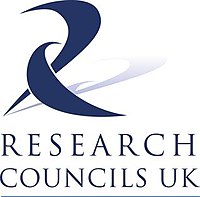Research Councils
 |
|
| Abbreviation | RCUK |
|---|---|
| Formation | 2002 |
| Legal status | Non-Departmental Public Body |
| Purpose | Funding of UK science research |
| Headquarters | Polaris House, North Star Avenue, Swindon, SN2 1ET |
|
Region served
|
|
|
Membership
|
7 UK Research Councils |
|
Prof. Rick Rylance Chief Executive of AHRC |
|
|
Main organ
|
RCUK Executive Group |
|
Parent organization
|
Department for Business, Innovation and Skills |
| Affiliations | BBSRC, EPSRC, ESRC, NERC, STFC, TSB, UKSA |
|
Budget
|
£3,000m |
| Website | www |
Research Councils UK, known as RCUK, is a non-departmental public body which coordinates science policy in the United Kingdom. Founded in 2002, the RCUK is an umbrella organisation that coordinates the seven separate Research Councils that are responsible funding and coordinating academic research for the arts, humanities, science and engineering. These seven bodies are:
The role of the RCUK is to:
Each of the Research Councils is an equal partner in RCUK, and each uses its best endeavours to identify and pursue opportunities for mutually beneficial joint working with one or more of the other Councils.
Research councils are non-departmental public body incorporated by Royal Charter. Each is governed by its own governing council comprising a mix of academic and non-academic members, appointed by the Secretary for Innovation, Universities and Skills following a public nomination. The councils receive public funds from the Department for Business, Innovation and Skills, and each reports annually to the British Parliament. In 2008 the combined annual budget was £3.5 billion, of which over £1 billion went to research grants and training at universities. This is one element of the UK's dual system of research funding, the other being block grants provided by the UK Funding Councils for higher education.
Research Council grants support around 50,000 researchers through 18,000 grants at any one time. About 8,000 PhDs are awarded annually as a result of their funding.
The Councils directly employ around 13,000 staff, 9,000 of whom are researchers and technicians at institutes such as the British Antarctic Survey, the Laboratory of Molecular Biology, the Roslin Institute, and the Rutherford Appleton Laboratory. However, in the UK funding system only a few permanent institutes that require permanent infrastructure are directly controlled or core-funded by the Councils. Most funding is allocated competitively and few awards last more than ten years, which allows the Councils to vary capacity to meet changing priorities and challenges.
...
Wikipedia
